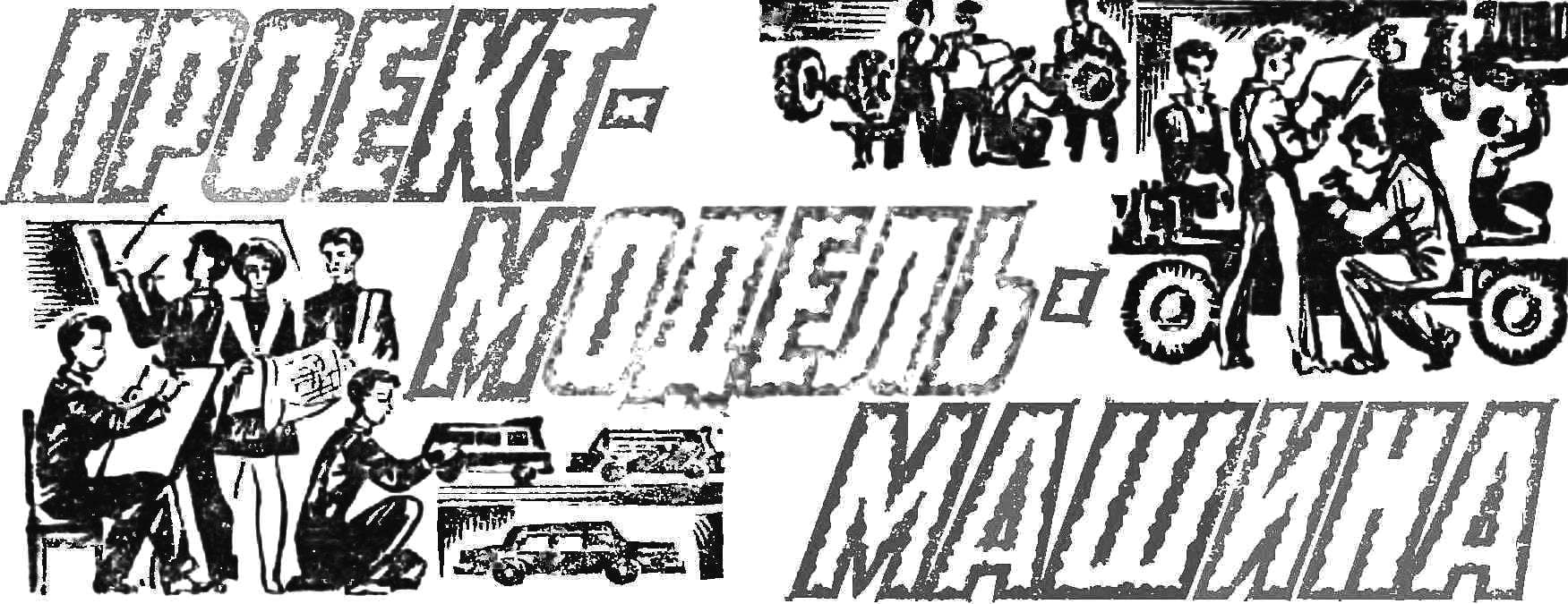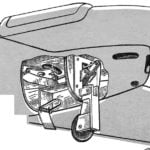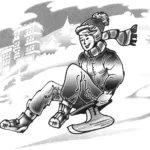 Design and manufacture of midget cars is one of the popular directions of technical creativity. This can be judged by the growing number of automodular presented at various technical exhibitions. Unfortunately, many of the infantile groups you have to “Torito” own way, repeating the mistakes of predecessors, not taking advantage of their good experience. In today’s post attempts to summarize the experience of autocostruzione in the laboratory of experimental modeling of the club of young technicians of the Siberian branch of the USSR Academy of Sciences.
Design and manufacture of midget cars is one of the popular directions of technical creativity. This can be judged by the growing number of automodular presented at various technical exhibitions. Unfortunately, many of the infantile groups you have to “Torito” own way, repeating the mistakes of predecessors, not taking advantage of their good experience. In today’s post attempts to summarize the experience of autocostruzione in the laboratory of experimental modeling of the club of young technicians of the Siberian branch of the USSR Academy of Sciences.
STARTED ON AN EMPTY PLACE.
Two rooms in the ground floor of the house — that was a lab autocostruzione 20 years ago. It was summer, classes in schools had not yet begun, and the first group members had to find on the street.
Went to the stadium. See — two boys of twelve years old chasing an empty tin can. Met, asked if they want to construct cars. The children happily said: “I Want!”
Talked for about an hour, quietly rasfantazirovalis and chalk on the floor drew sketches of several go-karts and cars of small. When touched on the material side of things (where to get the material for cars of the future), one of the NC boys, nick Busygin, announced that at the beginning of the school year the whole school will be collecting scrap metal, and from it you can select a mug and standing material: cutting water pipes, steel profiles, and even sheet iron. So the boys and left, having promised at parting to bring into the circle of his friends.
Who knows what would it ended, but, fortunately, we managed to get a scrapped wheelchair. Placed it through the window in the lab, and thus
THE SCOPE OF WORK WAS PROVIDED.
How much joy brought to children this old banger!
The boys took turns behind the wheel, twisting it and pulling levers. The rubbing rags of the wheel and the engine. Pestered with questions.
Meanwhile, we have autoconstruction was typed fifteen. Started an impromptu journal where he recorded all club members, and put together a lesson plan and at the request of the guys broke them into teams of three to four people each.
First, it was decided to dismantle the scooter into components, to verify proper operation of all to clean, lubricate and assemble again.
Eagerly took the case, and after two sessions it was already disassembled the PA part. Working children’s collective has evolved before our eyes. Watching from the sidelines, it was possible to determine who has the skill and dexterity: this was subsequently entrusted with more complex and delicate work. Purely theoretical studies are not carried out, but in the process messing around with the same scooter had told the boys about the purpose of each of the component design features, their interaction. Technical vocabulary of students has expanded rapidly. Sounded terms: sliding fit, a spring washer, clutch and many others. Boys began to learn the basics of technical literacy — to understand the drawings and diagrams.
Soon clean and sparkly details were laid out for the PA rack. By the time we got KSE-what a tool. Part of it was brought by members of the house and the Committee of the Union has gained for us, lapping and CNC lathes and workbenches for mechanical works. Now, when everything finally came together, the opportunity to seriously begin the real creative (design!) work.
To further entice the guys, announced a competition for the best little micro-car. Determined even award — the first to get behind the wheel of the future car. Conditions of competition have been quite complex: in the car it is necessary to use nodes from motorized wheelchairs; layout of units should be simple and rational; the dimensions of the body should provide a minimum, its form must meet the requirements of modern aesthetics.
Three days later, began to receive the first projects. For the consideration of created the authoritative jury consisting of the Director Cut, the artist, and the two heads of circles. After much debate, adopted a draft minicar “Protein”, developed by the student of the 8th class. I must say that among the bids met more interesting design, but they didn’t meet two points: the first and the second, since, in addition to units from the sidecar, other components and parts from the pass were not available. In essence, the “Squirrel” was a sidecar chassis with a five-seat wagon body type.
Three months of hard work, the bus managed to build. Decorated with flags and colored balls he led Viktor Alexeyev, was held before the holiday stands in the ranks of the may day demonstration. This event was the final approval of the circle, because it is said to have been recognized by the public.
Later design methods subcompact cars have changed. The fact that significantly increased our technical capabilities in Cute came the welder and milling machine, we were allocated a spacious bright room. We were able to centrally engines and individual components, aircraft “quilted” and wheels from scooters. And the members have acquired some experience, become more grounded in theory.
FOR A SMALL CAR — A WORKING MODEL
If during the construction of the “bus,” “Squirrel” we had, without further ADO, put on the repaired chassis sidecar is simply a new body, now we have designed afresh, based on the available Arsenal mug wheels, motors, lights, appliances and other aggregates. Experience in the development of the “Whites” showed that the error is purely in the layout order can be avoided if in the process of creating a machine to make her designs better acting.
Now, the author or group of authors primarily draw the sketch of the future vehicle, packing all the major aggregates and then make the model (usually in the scale of 1:5 or 1:10) with the obligatory painting it in the intended color. In the process of conceptual work and production of a model designer thus receives a lot of” idea of the future design.
There are cases when the young designer, it turns out the machine, the production of which is clearly beyond the capacity of such sketches and models we have, incidentally, much more than a job. But this does not reduce the value of search options as teachers, and experimental technical points of view. We are confident moreover that over time as “maturation” and a mug and authors, these models are “degenerate” in these compact cars.
We also worked on purely methodological developments. An example of this can be autoroller “Bunny”. This compact subcompact machine was well-liked. Many would like to receive our detailed technical documentation, recommendations for the construction and so on, up to the routings.
For the first time on the “Bunny” became a talking point when discussing the results of another one of our contests. The project presented the student of the 8th grade, Yuri Igolkin. He devised rationally arranged four crew on the aircraft “quilted” with the engine “Kourouta”. The picture I liked the guys, the car decided to do.
While picking up the necessary material, the author managed to make a model in scale 1:5. A reduced copy by the way, was excellent: of tinplate, and it is painstaking detail, the current steering, a “real” rear axle. Even the electric motor MU-100 has been decorated with a engine from K-175. The model took on “cheers.”
Two weeks welded frame and a future frame of the machine. A little more time was taken by the installation of springs, shock absorbers, engine and wheels. More time-consuming to manufacture cladding of the exterior and the interior of the car, but still the work was finished in record time — in just two months.
The machine and its creators have received well-deserved recognition — the car was demonstrated on VDNH USSR and the kids got medals “Young participant VDNH”. Now “Bunny” is demonstrated at the exhibition “Creative youth” all-Union pioneer Lagord Artek named after V. I. Lenin.
This method of development of micro cars entirely justified itself. In the short term it is possible to build in the circle a number of interesting small machines. Many of them are familiar to readers of “M-K”: a tricycle “March”, double-wheeled car “Falcon” and many others. Not to mention that all these machines are created by one generation of club — students who came to us from the 5th grade and became during this time a tenth.
We always looked at our laboratory not as a likeness of the technical schools, but rather as childish club where the boys could spend their free time, while developing not only skills, deepening knowledge acquired in school, but also getting satisfaction from the communication, exchange of ideas. Addressing daily technical a fascinating game-puzzles, the boy is asserting itself, each session ends with a proud samopoznanie: “I can do it!”
CONCLUSIONS AND PLANS
Frankly, neither we, the managers nor the members of incomprehensible so often received from many, sometimes very solid children’s organizations and Amateur designers of mails like: “We liked your car. We want to make it, please send detailed drawings and tell me if you can get the wheels from “Zaporozhets” and the engine of the M-72″, Begs the question: “Why? That will give young designers a blind imitation of our products?”
Surprising and different when in a school laboratory or in the Palace of pioneers “take the bull by the horns” and begin to build a “real” car. Build it over the years, one generation after another and complete sometimes, especially if the leader of the group hard enough. But most often this “avtomonstra” eventually lose interest and the car becomes a victim of a “Scrap” or stays in the Studio a monument to unfulfilled dreams.
Our recommendations are. Before developing a particular design, consider the possibility of their material: the machinery, the availability of required materials and assemblies, their design possibilities, determine the purpose of future cars, and most importantly — decide who and how much time will be able to translate your idea into metal.
Come to us letters, which address the issues of registration of diys in the SAI. This question in no way do not care. Our machines are not designed for use on the road, besides the traffic police requirements severely limit, in our opinion, the creative imagination of the boys. Goals and objectives we have other than, say, student design bureaus or clubs DOSAAF. We need objects for the development of creative abilities of children, we are trying to build something that no one else ever saw. And sometimes we do it.
From his twenty years of practical work we came to the following conclusions to Design and build should be simple and fast, and the object design should be compact, beautiful and absolutely essential to the club, otherwise nothing worthwhile out of your ploys will not work. And get this, the product must be possibility of its transformation, continuous improvement.
You need to ensure that the initiative always came from guys. Design and build needs for yourself members, of course, constantly advise and guide leader.
In our opinion, this is the only way to create a strong engineering team, capable of solving sometimes even complex tasks.
M. LARKIN, I. RYSHKOV



